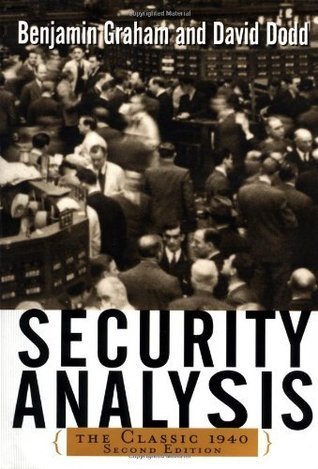What do you think?
Rate this book


The first edition of Security Analysis, published in 1934, forever changed the theory and practice of successful investing. Yet the remainder of that tumultuous decade brought unprecedented upheaval to the financial world, compelling Benjamin Graham and David Dodd to produce a comprehensively revised second edition.
It is that edition, out of print for decades, that you now hold in your hands. Security Analysis, Second Edition, published in 1940, is considered by many (including legendary Graham student Warren Buffett) to be vastly superior to the first. Yet after three subsequent editions and over six decades, the insightful and instructive second edition could be found only in rare bookshops and closely-guarded private collections.
McGraw-Hill, the book's original publisher, is honored to publish Security Analysis: The Classic 1940 Edition. Identical in every meaningful aspect to the classic original, this is the long-awaited book that set the tone for decades of value investors. Let it provide you with a greater understanding of this country's financial heritage, along with timeless value investing insights that have proven relevant and profitable in all types of markets and financial environmentsand will never go out of style.
"The lapse of six years since first publication of this work supplies the excuse, if not the necessity, for the present comprehensive revision ... We have revised our text with a number of objectives in view. There are weaknesses to be corrected and some new judgments to be substituted."From the Preface
The names Graham and Dodd have come to be inextricablylinked in the minds of thoughtful, disciplined investors. Their 1934 book Security Analysis made the two synonymous with intelligent, long-term investing, and forever changed the face of Wall Street. While post-Crash traders and investors treasured the book for its rigorous honesty, determined logic, and unequalled track record of success, the authors saw only the "weaknesses to be corrected."
The second edition of Security Analysis, published in 1940, allowed Ben Graham and David Dodd to set the record straight. It was considered by many then, and is considered by many nowincluding Graham student and disciple Warren Buffett, to be superior in many ways to the first. Still, as subsequent revised editions appeared, the once-indispensable second edition fell out of print and became virtually impossible to locate.
With Security Analysis: The Classic 1940 Edition, McGraw-Hill returns this long-sought investment classic to the marketplace. While its timeless advicethat investors should ignore social trends, company prospects, and management styles to focus on the balance sheetis as vital today as it was in 1940, it is the book's updated insights and observations that justify its importance in the annals of both investing and publishing.
Even as the financial world sang the praises of 1934's groundbreaking Security Analysis, Benjamin Graham and David Dodd knew they could improve it. And that they did, with the 1940 publication of a brilliant second edition. Now, after having been unavailable for decades, this influential book returns in Security Analysis: The Classic 1940 Edition. As powerful today as it was for investors six decades back, it will reacquaint you with the foundations of value investingmore relevant than ever in tumultuous 21st century marketsand allow you to own the only book that could rightfully claim to have improved upon the eloquent first edition of Security Analysis.
868 pages, Kindle Edition
First published January 1, 1934
"The future is often no respecter of statistical data."
"When an enterprise pursues questionable accounting policies, all its securities must be shunned by the investor, no matter how safe or attractive some of them may appear."
"Obviously it requires strength of character in order to think and to act in opposite fashion from the crowd and also patience to wait for opportunities that may be spaced years apart."
"Because figures are used in this process, people mistakenly believe that it is “mathematically sound.”"
"... if the adviser knew whereof he spoke he would not need to bother with a consultant’s duties."
"We and other investors today tend to focus on cash flow after capital expenditures (free cash flow), instead of earnings, to evaluate the investment merits of a business. One advantage of this approach is that it helps shortcut a good many games that management can play in reporting profits."
"The basing of common-stock values on reported per-share earnings has made it much easier for managements to exercise an arbitrary and unwholesome control over the price level of their shares. Whereas it should be emphasized that the overwhelming majority of managements are honest, it must be emphasized also that loose or “purposive” accounting is a highly contagious disease."
"Buying stock in new or virtually new ventures. This we can condemn unhesitatingly and with emphasis. The odds are so strongly against the man who buys into these new flotations that he might as well throw three-quarters of the money out of the window and keep the rest in the bank."